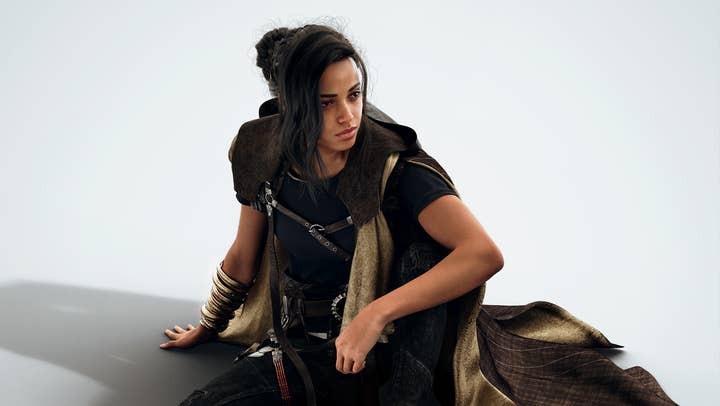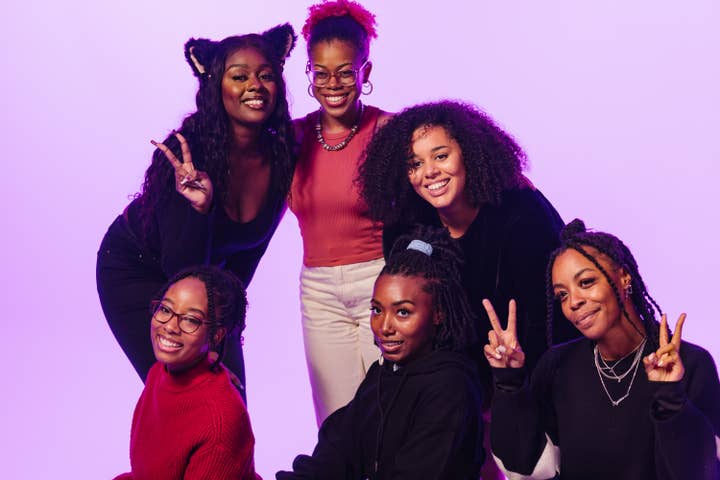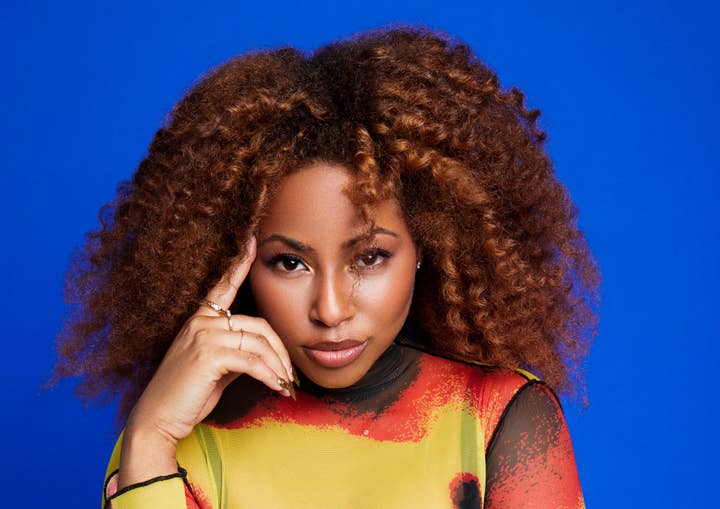Black Girl Gamers: "There's more work to be done" on representation in games
CEO Jay-Ann Lopez speaks about the ongoing push for DEI and holding the industry accountable along the way
Sign up for the GI Daily here to get the biggest news straight to your inbox
After eight years of diversity, equity, and inclusion work for Black women and gender non-conforming individuals, Black Girl Gamers (BGG) continues to stay the course.
Sitting down with GamesIndustry.biz, CEO Jay-Ann Lopez reflects on the organization's work and the games industry's stubborn stance when it comes to better reflecting the real world.
BGG recently announced that last month, it consulted on Square Enix's Forspoken, the first AAA game credit that the organization received. It's fitting, considering the game is on the short list of games that star Black women.
Lopez is candid when asked if this marked a good direction for diversity in the larger gaming space.
The CEO said, "It's a step in the right direction. I think games like Forspoken and Deathloop are definitely [a mark of] progression. I won't sit here and deny the industry those, you know, that they've done some of this."
Lopez quickly notes that despite these few relatively recent AAA titles starring Black protagonists, there's room for improvement.
"I don't think on a larger scale, [that] diversity, equity and inclusion is considered like as much as it should be, [such as] when it comes to representing not just Black characters but like other locales such as Africa and the Caribbean," she adds.
"It's important to congratulate the industry on its progress but not [to] say we're here now; we're not. When you look at who is consuming the games, and the disparity between that and who's making the games? The industry is still in a similar position."
She notes that those disparities are why the organization continues to give voice to the need for more representation and inclusion of people from overlooked communities, especially that of Black women and gender non-conforming individuals.
As to whether or not the games industry would be as forthcoming as it's been discussing DEI without organizations such as BGG, the CEO offers a simple response: "Definitely not."
She expounds, "We've been here since 2015, and BGG provided a united front and capacity to scrutinize the industry. Without organizations like [ours], that would not have happened. A lot of Black and non-white content creators, in general, were assimilating to this dude-bro culture at the time.
"You don't have to like what we're saying, but we're not changing it to make the industry feel better."
Often, when the BGG organization speaks about gaming becoming more welcoming, it will still echo the message that "there's more work to be done" for representation and equity. This consistent messaging is purposeful because she wants people to take wins as the final destination for a more representative industry.
Lopez explains, "This is why BGG still exists and why we still continue to do what we do in all the different lanes now, as opposed to just being in a Facebook group or Discord. Our business does events, talent brokering, consulting, content, and community. We do all of those things, and as much as we do, we're always looking for the next way to create impact.
"No one's perfect, no one organization input is perfect, including [us]; we always have to improve."
She notes that many consultants are working with gaming firms on better representation but the public is mainly unaware due to NDAs.
Following the murder of George Floyd in 2020 and the industry's reaction, Lopez still wonders what was behind those statements for more equity and diversity.
"Everything has to be followed through with the ability to create impact and the ability to create equity."
She adds, "I think that a lot of the DEI happens in the marketing side of the industry, which is why it was so important for us to consult on Forspoken and other projects."
Previously in speaking with GamesIndustry.biz, Lopez explained that many companies don't issue DEI reports. In addition, when firms release their employee statistics, they often do not include an intended target for staffers from overlooked communities. The BGG CEO calls this a lack of intention from some companies.
"This is why you need Black and non-white people at a leadership level. [Companies] are not always going to have the lens to do something that's not reactionary"
"It's just that it's not their lens, and this is why you need Black and non-white people at a leadership level. [Companies] are not always going to have the lens to do something that's not reactionary, that is proactive and has DEI built into it."
She explains further, "When it comes to any other area of the business, there's a robust strategy, there's understanding [a firm] will hire the top five consultancies to do work in the company, like the management consultants or like they will understand when to hire a consultancy for that. But when it comes to DEI, let's try and figure it out on our own."
Lopez adds that this has been a frustration throughout her career. As she continues to reflect on the industry's work over the years, she says, "I think the pace is too slow" when creating a more inclusive industry.
"I think the drive has gone down again…But also, there are vanity projects out there.
"I had a call with a brand recently that wanted to talk about abuse in gaming. It had one white woman in the campaign. [It] then had to find Black women a week before the campaign shoot. [The company] also underpaid the Black women involved, including me.We said no and kicked up a fuss. So we've had these [scenarios] non-gaming and gaming brands coming into the space with this."

Knowing your worth and staying informed remains just as crucial to Lopez now as in 2015. With that in mind, BGG will bring back its online summit to offer educational resources regarding the games industry.
The summit will provide details such as streaming deals, exclusivity clauses, fee distribution, and how to read a contract.
The CEO of BGG hasn't rested on bringing change to the industry; back in February, she was hired as COO of JumpButton Studio, working remotely, and will continue working as CEO of BGG.
The executive said that the decision didn't mark any change in her perspective of creating a more welcoming industry, but it was a choice to be more active in her efforts for that goal.
"I don't want to work for an organization continuing the status quo"
She explains, "That's partly why I joined them because, with JumpButton, we're aiming to increase the diversity in the industry from 4% to 7% in ten years. That's really important for me.
"I don't want to work for an organization continuing the status quo. Such brilliant minds are there, and it shows me the industry is missing a lot [regarding] people."
Lopez continues, "It didn't change my views on what companies could be doing, but it did enlighten me to more of the details around being a game developer."
Lopez highlights that joining a games studio that will innately highlight new narratives that star people from different backgrounds was also critical. She says this is much more preferable than trying to combat the systemic hurdles with more established series and franchises.
"I don't want to have to fight through a brick wall of trying to get them to add or expand or to have a spinoff game for this black character that they've never paid attention to"
"I don't want to have to fight through a brick wall of trying to get them to add or expand or to have a spinoff game for this black character that they've never paid attention to…I want to create new stories in gaming, help them thrive and like be a support network for the people working in the organization," she adds.
Balancing the work of COO and CEO of two companies/organizations sounds like a grand undertaking. However, Lopez explains that when she was approached for the position, JumpButton CEO Nicodemus Madehdou was very familiar with her work and responsibilities with BGG.
Her expertise as a connector of people and creating events was key to her hiring. While maintaining these executive roles is a constant balancing act, it's not new. She reminds GamesIndustry.biz that she's been doing this since she became CEO of BGG in 2015.

The organization has done a lot of work over nearly a decade. When reflecting on what's been a highlight, Lopez names multiple projects; Gamer Girls Night, the BGG online summit, and the organization's talent development.
She adds, "We've put over $190,000 in black women's pockets that came from streaming employment and talent brokering events."
"When you look at who is consuming the games, [there's a] disparity between that and who's making the games"
The CEO feels that there are a lot of vanity projects in the space that BGG operates within. It requires a lot of work, but people often only perceive the "sexy part" of the efforts needed to run the outfit.
Lopez says, "I have to work till [1am] to get things done." However, she does see that the group has inspired others and continues to do so.
"There was a time when all of our tweet Twitch streamers were getting partnered on Twitch on their professional platforms. It's open doors that people don't [often] speak about."
Whether or not it's widely spoken about, these efforts and results have become validation for the CEO. She adds, "That's what warms my heart."
Looking ahead, Lopez explains that she looks forward to continuing the work and growing inclusivity within the games industry. It won't be easy, but the BGG CEO and JumpButton COO says, "I welcome it because I like to be challenged. That's the only way to learn to navigate these situations."
Sign up for the GI Daily here to get the biggest news straight to your inbox

